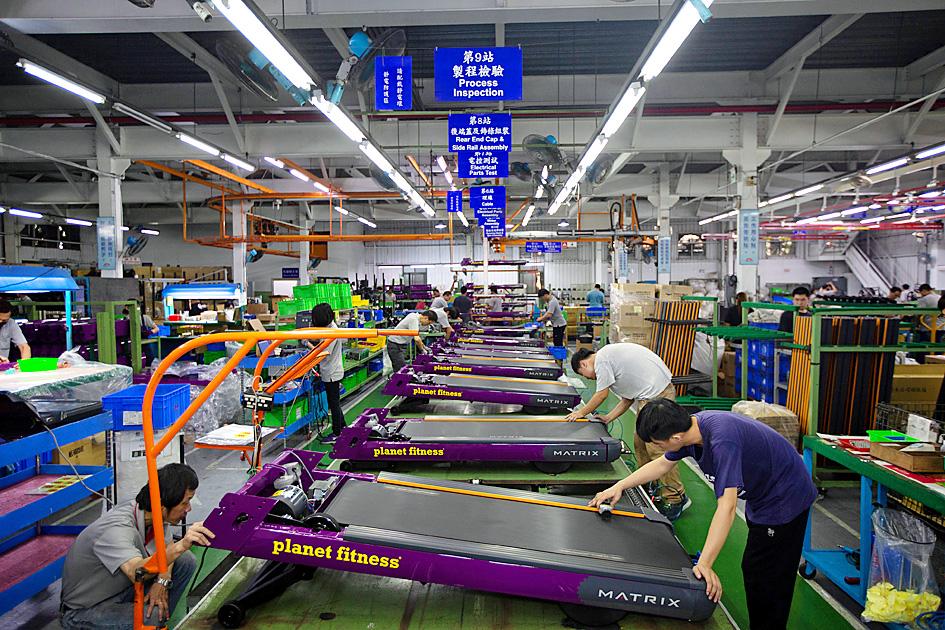Johnson Health Tech Co (喬山健康科技) on Thursday reported a 32 percent increase in revenue last month to NT$3.94 billion (US$138.5 million), beating market expectations and hitting a record.
The world’s second-largest fitness equipment maker said in a statement that last month’s revenue growth, a 13.13 percent increase from a year earlier, was mainly driven by strong demand for home fitness products, which grew 198 percent year-on-year on the back of its sales channel expansion from retail and wholesale distributors to e-commerce platforms and hypermarkets.
Given temporary gym closures amid COVID-19 lockdowns, global home fitness equipment sales grew significantly last year from a year earlier, while more people took to working out at home due to rising health awareness caused by the pandemic, the Taichung-based company said.

Photo: Ashley Pon, Bloomberg
Johnson Health’s revenue in the fourth quarter totaled NT$9.63 billion, up 28.83 percent quarterly and 17.6 percent annually, while overall revenue for last year increased 11.44 percent from a year earlier to NT$28.28 billion, also a record, company data showed.
In addition to home fitness equipment, Johnson Health’s product line includes treadmills, exercise bikes, cardio machines and elliptical trainers, primarily sold to commercial facilities such as gyms.
The company said that demand for home fitness equipment would remain steady thanks to sales channel and product lineup expansions, while orders for commercial products would increase as gym chains would resume normal operations as the pandemic eases and vaccines are rolled out.
In addition, sales of massage chairs by Japan’s Fuji Medical Instrument Manufacturing Co are expected to contribute to Johnson Health’s revenue this year, it said.
The company last year acquired a 60 percent stake in Fuji Medical, which markets its chairs under the brand Fujiiryoki.
Separately on Friday, local rival Dyaco International Inc (岱宇國際) said it is optimistic about this year, as demand for home fitness products remains strong in the US, and as the company has clear order visibility through June, while a shortage of shipping containers has led to limited supply, driving up strong pull-in orders from major customers.
“Dyaco will work hard to increase the capacity utilization of its production bases in Taiwan and China, coupled with more efforts like adding prices to secure containers to meet customers’ demands,” the company said in a statement.
Dyaco owns the Spirit Fitness and Xterra Fitness brands, but also makes and distributes products for other brands, including Sole Fitness and Fuel Fitness.
The company posted record-high sales of NT$2.01 billion for last month, up 241.88 percent annually. Cumulative sales for last year climbed 124.35 percent year-on-year to NT$13.11 billion, also a record high, it said.
Dyaco attributed the sales growth to a strong fourth quarter, when the industry entered the high season, while a home exercise trend in the US helped boost last year’s total shipments to more than 100,000 units.

Meta Platforms Inc offered US$100 million bonuses to OpenAI employees in an unsuccessful bid to poach the ChatGPT maker’s talent and strengthen its own generative artificial intelligence (AI) teams, OpenAI CEO Sam Altman has said. Facebook’s parent company — a competitor of OpenAI — also offered “giant” annual salaries exceeding US$100 million to OpenAI staffers, Altman said in an interview on the Uncapped with Jack Altman podcast released on Tuesday. “It is crazy,” Sam Altman told his brother Jack in the interview. “I’m really happy that at least so far none of our best people have decided to take them

BYPASSING CHINA TARIFFS: In the first five months of this year, Foxconn sent US$4.4bn of iPhones to the US from India, compared with US$3.7bn in the whole of last year Nearly all the iPhones exported by Foxconn Technology Group (富士康科技集團) from India went to the US between March and last month, customs data showed, far above last year’s average of 50 percent and a clear sign of Apple Inc’s efforts to bypass high US tariffs imposed on China. The numbers, being reported by Reuters for the first time, show that Apple has realigned its India exports to almost exclusively serve the US market, when previously the devices were more widely distributed to nations including the Netherlands and the Czech Republic. During March to last month, Foxconn, known as Hon Hai Precision Industry

PLANS: MSI is also planning to upgrade its service center in the Netherlands Micro-Star International Co (MSI, 微星) yesterday said it plans to set up a server assembly line at its Poland service center this year at the earliest. The computer and peripherals manufacturer expects that the new server assembly line would shorten transportation times in shipments to European countries, a company spokesperson told the Taipei Times by telephone. MSI manufactures motherboards, graphics cards, notebook computers, servers, optical storage devices and communication devices. The company operates plants in Taiwan and China, and runs a global network of service centers. The company is also considering upgrading its service center in the Netherlands into a

Taiwan’s property market is entering a freeze, with mortgage activity across the nation’s six largest cities plummeting in the first quarter, H&B Realty Co (住商不動產) said yesterday, citing mounting pressure on housing demand amid tighter lending rules and regulatory curbs. Mortgage applications in Taipei, New Taipei City, Taoyuan, Taichung, Tainan and Kaohsiung totaled 28,078 from January to March, a sharp 36.3 percent decline from 44,082 in the same period last year, the nation’s largest real-estate brokerage by franchise said, citing data from the Joint Credit Information Center (JCIC, 聯徵中心). “The simultaneous decline across all six cities reflects just how drastically the market